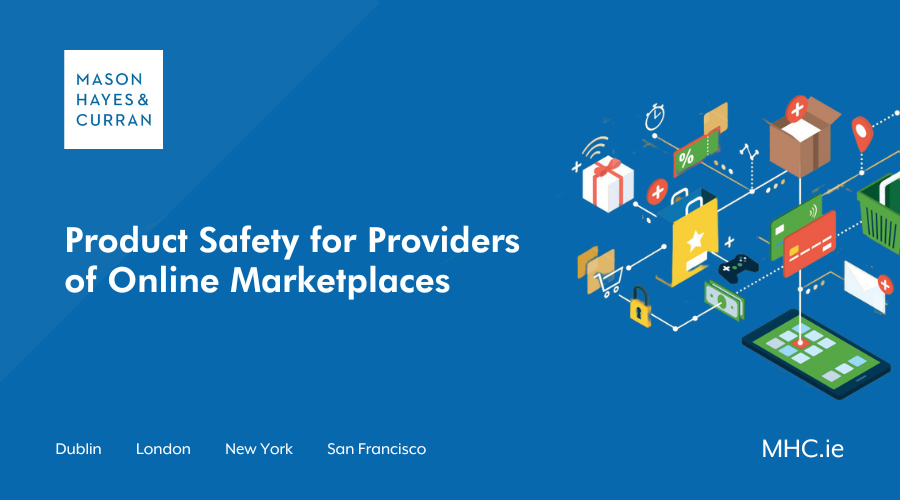Product Safety for Providers of Online Marketplaces
The EU General Product Safety Regulation

First the Digital Services Act, now the General Product Safety Regulation - online marketplaces are facing more and more regulatory obligations. Our Products team sets out seven actions that ‘providers of online marketplaces’ will have to take in order to comply with new EU product safety requirements.
E-commerce marketplaces in the EU will soon be subject to specific product safety laws. The new General Product Safety Regulation, or GPSR, entered into force in June 2023 and will apply to products placed or made available across the EU market from 13 December 2024. As well as economic operators like product manufacturers, importers, distributors, authorised representatives and fulfilment service providers, it will require ‘providers of online marketplaces’ to comply with new product safety obligations. We cover what these new requirements are and who they will apply to.
What is a ‘provider of an online marketplace’ (POM) under the GPSR?
A POM is defined under the GPSR as “a provider of an intermediary service using an online interface, which allows consumers to conclude distance contracts with traders for the sale of products”. Practically speaking this means that most if not all platforms and websites that facilitate the selling of products that are placed or made available on the EU market will be regulated as a POM under the GPSR
Depending on the nature of its business model, a POM may also be subject to other requirements under the GPSR applicable to other types of economic operator. For example:
- A POM that sells its own-branded products may assume the responsibilities of a manufacturer
- A POM that buys and resells on its own account products made by other manufacturers, as opposed to simply providing an intermediary service, may qualify as an importer or distributor
- Providing warehousing, packaging and/or addressing and dispatching services in connection with products sold via its platform may trigger requirements as a fulfilment service provider
What will POMs need to do?
1. Contact points
The Safety Gate System is an EU-wide information sharing system that connects Market Surveillance Authorities (MSAs), the European Commission, economic operators and consumers. It allows information about unsafe products to be shared so that appropriate action can be taken everywhere in the EU. The Safety Gate Portal is a part of this system and allows consumers to access information on unsafe products and submit complaints. POMs must designate a single direct email address for MSAs to contact them and register that address on the Safety Gate Portal.
POMs must also designate a single point of contact for consumers, such as an email address, allowing them to communicate directly and rapidly with POMs on product safety issues.
2. Removal of content – dangerous products
In line with powers conferred on MSAs, and subject to minimum conditions set out in the Digital Services Act (DSA), MSAs will be able to issue orders to POMs requiring them to remove, disable access to or provide explicit warnings about specific content referring to offers of dangerous products on their platforms. These orders will have to be acted upon by POMs without undue delay and in any event within two working days from receipt of the order.
POMs will also be required to suspend services to traders that frequently offer non-compliant products, in line with similar requirements provided for under Article 23 of the DSA.
3. Monitoring - MSA notifications
POMs must also monitor the Safety Gate Portal for dangerous product notifications submitted by MSAs using the Safety Gate Rapid Alert System. POMs must then take appropriate actions to detect, identify, remove or disable access to any content which refers to those products on their platforms.
4. Processing notices – illegal content
POMs will need to process any notices relating to product safety that they receive in accordance with Article 16 of the DSA. Article 16 requires certain online platforms to put mechanisms in place to allow any individual or entity to notify them of the presence on their service of specific items of information that the individual or entity considers to be illegal content. Under the GPSR, POMs are required to process these notices without undue delay and in any event within three working days from receipt of the notice.
5. Providing information - products
POMs must design and organise their platforms in a way that allows traders to make the following information about each product available to consumers and easily accessible on the product listing:
- The name of the product manufacturer and its address (electronic and postal) and the same for the responsible person as required under Article 16 of the GPSR or Article 4 of the Market Surveillance Regulation, if that manufacturer is based outside the EU
- Product identifying information - including picture, type or other identifier
- Product warnings required under the GPSR or other EU harmonised product safety legislation
This obligation is similar to article 31(2) of the DSA, which also refers to the trader being enabled to provide information on product labelling, safety and product compliance. Note that it is the trader or the seller who must provide the product information to consumers. At the same time, it is the POM’s obligation to design its interface in a way that enables the seller to provide the information. However, the DSA also puts a verification obligation on the POM, as Article 31(3) of the DSA requires the POM to make best efforts to assess whether traders have provided all the required product information before the POM allows the trader to sell products on the marketplace.
6. Providing information – traders
POMs must also put in place internal processes enabling traders to provide:
- The trader’s “self-certification” that they have committed to offer only GPSR-compliant products and information
- Additional information required by Article 30(1) of the DSA regarding traceability of traders
7. Cooperation on corrective actions
POMs must cooperate with MSAs, traders and other relevant economic operators to facilitate the elimination or mitigation risks by a product that is or was offered online using their platform. The GPSR sets outs various specific obligations of POMs under this heading such as:
- Publishing information about product safety recalls on their platforms
- Notifying consumers who bought a product via their platform about any recalls or safety notices issued in respect of it
- Notifying MSAs and traders using the Safety Business Gateway (another part of the Safety Gate System) of information on dangerous products
- Informing relevant economic operators about decisions to remove access to content referring to offers of dangerous products
- Cooperating with MSAs on product recalls, including by abstaining from obstructing recalls
- Allowing MSAs to access and use online product safety tools on their platforms e.g. webcrawlers
- Cooperating in tracing the supply chain of dangerous products by responding, as far as possible, to data requests from MSAs
- Keeping national and EU-level law enforcement agencies updated on content that has been removed from their platforms pursuant to GPSR requirements
- Allowing scraping of data on their platforms for product safety purposes, on receiving reasoned requests from MSAs.
Next steps
Organisations have until December 2024 to achieve compliance with these new requirements. They should first consider whether the “provider of an online marketplace” definition applies to them. If it does, they should begin taking steps to ensure that they incorporate the necessary systems and processes to satisfy these new requirements. This may require a significant and sustained commitment of resources in some cases, depending on the volume and variety of products being offered and the number and location of their sellers.
Considerable resources may also be required given that compliance with these new obligations will require proactive monitoring and engagement with various stakeholders on an ongoing basis. For that reason, impacted organisations should make use of the time remaining to identify any compliance gaps and put in place plans and processes to make their platforms GPSR-compliant.
For more information and expert advice regarding the impact the GSPR will have on your operations, contact a member of our Product Regulation & Consumer team.
The content of this article is provided for information purposes only and does not constitute legal or other advice.
Share this:





